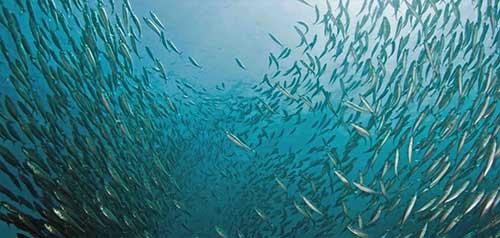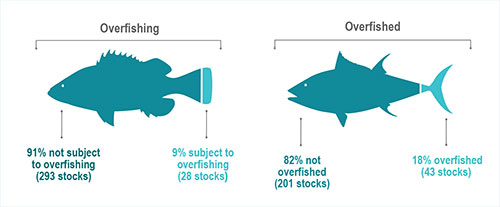
Number of U.S. fish stocks at sustainable levels remains near record high Says Report
August 05, 2019
Building upon the trend of the past few years, the report notes that the vast majority of U.S. fish stocks were at sustainable population levels in 2018, and the number of U.S. fish stocks subject to overfishing remains at a near all-time low. The report also documents a newly-rebuilt stock, smooth skate in the Gulf of Maine. This brings the total number of rebuilt U.S. marine fish stocks to 45 since the year 2000, an encouraging indicator that the U.S. fishery management system is achieving its long-term sustainability goals.
“The U.S. is an international leader in fisheries management, and through our work in partnership with the regional councils, we're on track to maintain that high standard,” said Rear Admiral Timothy Gallaudet, Ph.D., NOAA’s assistant secretary of commerce for oceans and atmosphere. “Our fishing communities continue to succeed and contribute to the Blue Economy. In 2016 alone, U.S. commercial fishing, recreational fishing, and the seafood industry generated $212 billion in sales, contributed $100 billion to the gross domestic product, and supported 1.7 million full- and part-time jobs.” A stock is on the overfishing list when the harvest rate of that species is too high. Of 321 stocks with known status, 293 (91%) are not subject to overfishing. The remaining 28 stocks (9%) are subject to overfishing. Seven stocks were removed from the overfishing list, and five were added in 2018. As required under the Magnuson-Stevens Act (the U.S. ocean fisheries law), NOAA Fisheries works with regional fishery management councils and other partners to implement measures to immediately end overfishing.
A stock is on the overfished list when the population size of a stock is too low, whether because of fishing or other causes, such as environmental changes. Of 244 stocks with known status, 201 (or 82%) are not overfished, leaving 43 stocks (18%) listed as overfished. No stocks were removed from the overfished list in 2018, but eight were added. Several of these stocks are impacted by factors outside the control of domestic fisheries management. For example, for three stocks of coho salmon in Washington state, warmer water, drought or habitat degradation contributed to less than ideal spawning conditions. One stock has been declared rebuilt: Smooth skate in the Gulf of Maine, which had been in a rebuilding plan for nine years under strict management. "Achieving sustainable fisheries requires sound science, innovative management, effective enforcement, meaningful partnerships, and robust public participation," said Chris Oliver, assistant administrator for NOAA Fisheries. "We are well positioned to meet the sustainability challenges of today and tomorrow thanks to the hard work of our fishermen, fishing communities, scientists and many other partners."
On the Web:
Edited by Mary Kauffman, SitNews
Source of News:
|
|||||

